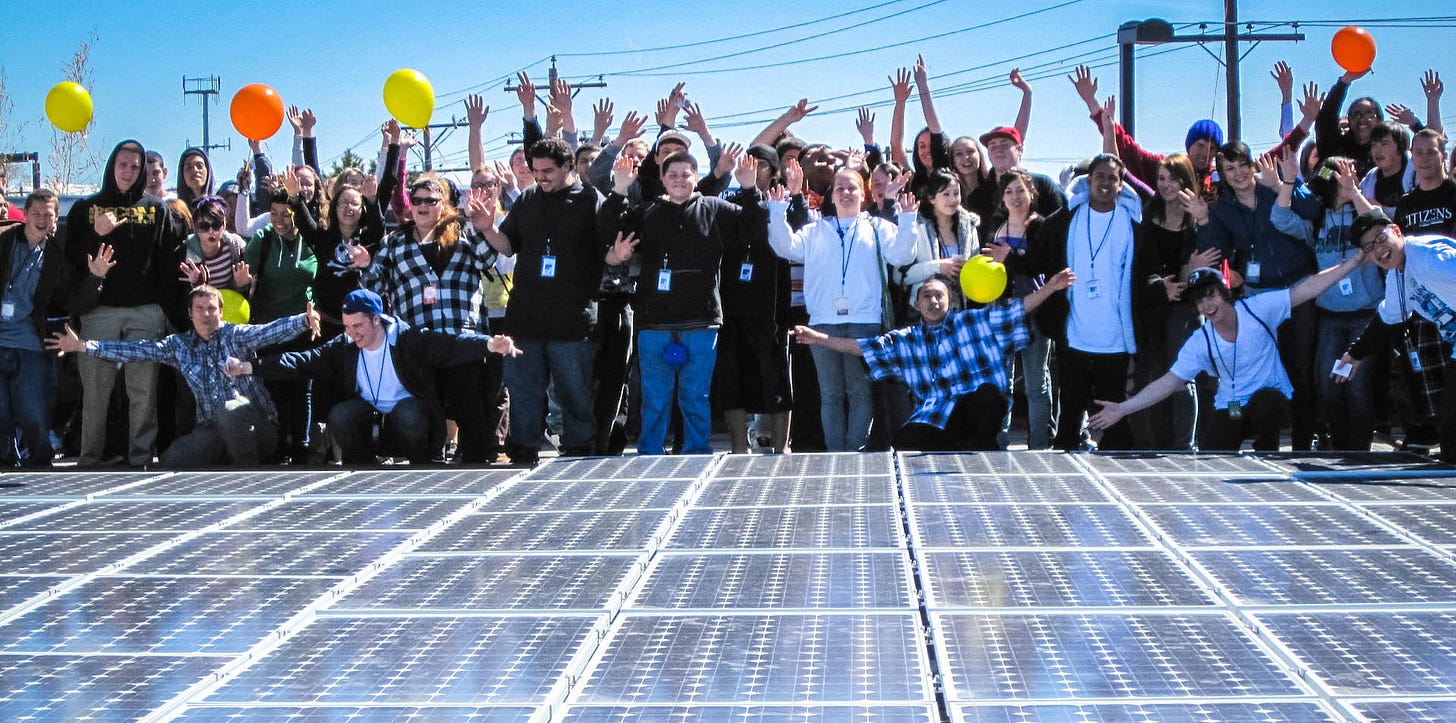Taking back power: is it time to think seriously about community energy?
In light of Europe’s energy crisis, community-led schemes could provide a more secure and renewable system.
As the energy sector is destabilised, the need for ‘community energy’ is more pressing than ever.
The movement, which supports a transition from fossil-fuel-generated power to renewable sources of electricity, aims to put power into the hands of communities who can buy into local solar, hydro, or wind-powered energy solutions.
Placing energy back into the hands of communities could provide 2.2M UK homes with renewable energy by 2030, whilst reducing household bills by £150M a year. Additionally, such a move could raise £1.8M for local economies and provide up to 8,700 jobs across the UK.
The cost of Europe’s energy crisis
Within the context of our latest energy crisis, getting a greater portion of our energy from community projects seems like a no-brainer.
Whilst 43% of the UK’s electricity is produced by renewables, approximately half remains reliant on gas-fired power plants dependent on fossil fuels.
Meanwhile, a crucible of issues from ageing nuclear reactors to a chaotic market (further destabilised by the pandemic and Brexit) has left the UK dangerously reliant on foreign powers for its gas and electricity supply.
Last week, the UK’s seventh biggest energy supplier, Bulb, went into special administration. Its promise to continue to supply its 1.7M household customers will borrow heavily from the public pocket.
According to Investec, the public bailout for electricity companies this winter roughly equates to £120 per customer or a vast overall total of 1.7B. As a result, the public has been primed to expect blackouts this winter – one of the coldest yet. Gas and electricity prices are expected to rise astronomically.
Aside from the financial burden on the public, Europe’s energy crisis risks jeopardising the UK’s targets for cutting carbon emissions. Our current transition to ‘clean energy’ is not going as quickly as hoped, as global demand for power currently outweighs supply.

Making it happen
What might a community energy project involve? In Gwynedd, North Wales, Energy Local Bethesda is harnessing the power of the Ogwen river with a community-owned hydroelectric plant.
The project, driven by the citizens’ desire to challenge the effects of climate change, began in 2016 and equipped local houses with smart meters, reducing household energy costs by 10-30%.
The scheme has been an overwhelming success and is now able to supply the community with energy at a lower price than the national grid, whilst providing surplus revenue to reinvest in future renewable projects.
Another project is run by social enterprise Energise Barnsley. To reduce fuel poverty in the Yorkshire town, the council and a handful of independent organisations bought into a community-owned energy scheme.
The project oversaw the instalment of solar panels to power 321 council-owned properties, 75% of which housed elderly tenants, who saved over £40,000 in bills. Further profits from the scheme were channelled into a community benefit fund.
Working towards better legislation
Despite these promising case studies, the UK government legislation that has so far hindered the development of community energy. People do not yet have the right to local supply.
“If you want to buy your electricity from local renewable sources, such as the local school or sports hall that have solar panels on their roofs”, write campaign group Power for People, “you cannot.”
“We all buy our electricity from a utility company that sources it from anything connected to the National Grid, be it a field of solar panels in Wiltshire or a gas-fired power station in Yorkshire.”
The non-profit highlights “unfair regulations” and “hugely disproportionate costs”. It is fighting to get something called the Local Electricity Bill – which would enable an overhaul of the current system and allow individuals to control where they get their energy from – through Parliament.
Debated yesterday: the Local Electricity Bill
Yesterday, the Bill was debated – with cross-party support from MPs representing all four UK nations.
Caroline Lucas MP emphasised it would allow for "a proliferation of local energy companies, a real diversity and ecology of those companies and a much stronger sector as a result.”
“Community energy isn’t just a nice to have”, she said; and can’t be “just the cherry on top of the sustainability cake, it is a fundamental part of the total energy mix.”
At the end, Wera Hobhouse MP concluded,
“I thank the Minister for offering to meet us and have that engagement. I am a little disappointed that he has still not quite understood what we all think: that the current system does not work because it is too centralised, and that the Government must face the brave new world of decentralisation to set free the power of local electricity.”
“I hope that we will receive a more positive reply when we come back to debate this topic, yet again, in this Chamber or the main Chamber.”
The pursuit of greater capacity for community energy continues.
Visit Power for People for tips on how best to take action.
Al Howard is a staff writer at Ours to Save, interested in space, art and saving the planet. You can follow her on Instagram.




